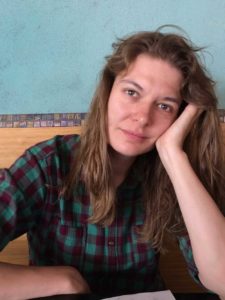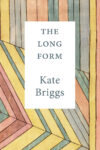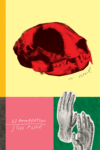 This essay first appeared in the Full Stop Quarterly, Issue #9. To help us continue to pay our writers, please consider subscribing.
This essay first appeared in the Full Stop Quarterly, Issue #9. To help us continue to pay our writers, please consider subscribing.
Those of us who came of age in the 1990s may be the last generation—for a while anyway—to truly understand the possibilities of disappearing. Back before the advent of cell phones and social media, we could, still, in a sense, get lost. Picking up playwright Tanya Marquardt’s debut book, Stray: Memoir of a Runaway, evoked in me a longing for a time when I said goodbye to my parents, hopped in a friend’s car, gallivanted around town till all hours (I was lucky in that I never had a curfew), and returned home when I pleased, with no trail of where I’d been or what I’d been up to. Those days are long gone. Lovely though that way of life sounds, nostalgia is not Stray’s focus. Instead, the freedom Marquardt finds over the course of Stray’s narrative is a double-edged sword.
Tanya Marquardt and I were born a year apart, though on different coasts, and in different countries (she in British Columbia, Canada; me in Massachusetts, USA); we were also born to remarkably different familial and class circumstances. We might both have identified—in those formative years—as outsiders, but our similarities probably ended there. Stray catalogs Marquardt’s years as an on-again/off-again runaway, formative years in which she yearned to escape from the screwed-up family dynamics she was born into. When her attempts to physically remove herself fail, she turns, increasingly, to drugs and alcohol. Using letters, journals, and her memory, Marquardt weaves with raw detail the world of a working-class teenager desperate to get away from a dysfunctional family. Stray covers a two-year span—from Marquardt’s 16th birthday to her admission to college—during which she begins the brutal process of carving a place and identity for herself. Though her mother works hard to keep Marquardt on a tight leash—and perhaps inadvertently pushes her farther away by doing so—Marquardt absconds to the alternative, goth subculture offered by her group of friends. This descent, as is so often the case in situations like this, saves her, even if it does its own kind of damage.
There is much anger fueling Stray’s narrative, and rightfully so. Tanya Marquardt’s story might be a particularly fraught and painful version of the standard adolescent dilemma associated with declaring one’s place in the world, but she renders the alienation, fear, and anxiety that so many of us experience during our teenage years with a fine hand, while also giving clear voice to her own truths.
Tanya Marquardt and I connected via email in mid-October, to discuss trauma, addiction, the difference between writing memoir versus plays, engaging with memory on the page, and more.
Sara Rauch: What prompted you to write Stray?
Shortly after the photos in Abu Ghraib were leaked to the public in 2004, I wrote a play in response called Transmission, about a radio announcer dealing with the disappearance of his sister, a war photographer presumed to have died years before on assignment. I had the brother and sister recount stories of their childhood, when they were dealing with their abusive father, and used these stories as a way to talk about broader political issues; war and torture and disappearance. Writing and producing the play took over two years, and I felt that it was strong work. But when I sat down to watch the piece I was dissatisfied, almost to the point of getting up and leaving the theatre. I had never felt that uncomfortable watching my plays and I started to question that feeling. Like, why do I hate this play when all the elements are working? I spent a few nights trying to figure it out, and the answer really shook me. The thing is, I wrote the play as a way to talk about trauma—what it does to the body over time, how it infests and manifests over the course of a life, and the continual though often broken attempts to heal from that trauma. And because I gave many of my own stories of trauma to these fictional siblings, I felt like a fraud. It was like I was hiding in shame behind these real and visceral memories of emotional and physical abuse, abuse that happened to me and to my body. Once I had that realization, I knew that if I wanted to explore these ideas around trauma, that I had to write from a first person perspective, and publicly own those memories as my own. I never set out to write Stray as a memoir and spent about a year freewriting until the structure came to me. Then I wrote short personal essays that I shaped over a decade and that eventually became the book.
Prior to writing Stray, you’ve written a number of plays. What kind of differences did you find between writing a book and playwriting?
A book is created for a reader who is having a personal and private relationship with your story, whether in their home or on the subway, that they can dip into and out of at their own pace. A play is meant to be seen live and in a performance space, transmitted to an audience in real time through the actor’s voice and body. Because an audience can sense the subtext of a scene by looking at the set and the performers or listening to the dialogue, I never had to delve into exposition or nuanced descriptions of time, place, or setting when playwriting. This layering of the internal and external was a huge leap for me when I started writing memoir. I would often write the dialogue first and then add exposition, internal dialogue, character description and reflection. Sometimes I wrote chapters like a play and then translated them into paragraph form. That took a long time, but after a while the style became more familiar and I was able to craft the dialogue and the exposition simultaneously. I think this is one of the reasons that it took me a decade to write Stray. There was a translating from one form to another, and a learning process that, while gratifying, slowed down the writing. But going slow was good for other reasons because it helped me to tease out detail in my memories, and to really question how I feel about that time in my life.
Can you describe your process of dealing with and capturing memories for the book? How did you decide what to include and what to leave out?
The first flush of writing felt manic, because I had all of these memories that were wanting to come out onto the page and others bubbling up underneath those. I would write longhand in my journals for hours at a stretch because it felt like I had opened a floodgate. And though I am in recovery now, I wasn’t then, and was drinking a lot, and not fully dealing with my life, let alone the writing. I wouldn’t recommend writing while drinking. That romantic mythos of the wine-guzzling memoirist letting the booze make her more pliable is just that, a mythos. The reality is pain; hard to carry, at times overwhelming, the addiction like a wave that is always threatening to overtake you. It was sobriety that actually helped me write. It helped me craft the work into a piece of literature, which is what happened when I started to look over that first flush of writing. There was a crucial moment where I could see the accumulated memories as the building blocks for a narrative, and once I was able to do that I started to jump around in time, pulling memories out of chronological order so that I could tease out themes and metaphors that I wove throughout the text. Ordering the sections became double pronged, I wanted to carry the reader through the narrative from one story to the next, as in any work of literature, and I wanted to reveal the myriad of ways that I engaged with my memory. This revealing was impulsive and constructed, with my memories demanding how they wanted to be told and me using my memories as a way to talk about the act of memory itself, writing about what could have happened, what I wished happened as opposed to the reality, the ways my memories differed from those around me, and the things that I will never forget, reflected on from an adult perspective. I think sometimes there is this misconception that a memoir is a diary published for a reader. And this ordering, the decisions of what to include or omit, what to reflect on, what to leave blank, is what distinguishes it as a literary work, no different than fiction or playwriting, or dance or theatre for that matter.
When you write about the abuse your (step)dad inflicted on you, you do so in a very even tone—in a way, leaving the reader to make the judgements you can’t—was this a purposeful choice?
Yes, this was a conscious choice. Once I knew that I was going to talk about abuse, I wanted to leave it on the page, action by action, without much reflection. This is how it happened to me and to my body because the ability to feel or to process what was happening was taken from me by the abuse itself. And I wanted the reader to know that. And also, I think that there is a tension when writing about trauma, where if you over describe the emotions surrounding it, or the internal sensations, or even reflect on the trauma too much, the scene becomes overwrought and it’s a way to deflect from the intensity of that damage. I didn’t want the reader to be able to look away, or to tell themselves that it was okay because I told them I was okay. I wanted them to see the abuse for what it was at the time that it was happening.
Your portrayal of addiction and destructive behavior—in both you and your friends—is rendered in a similarly matter-of-fact way. There’s cutting and underage drinking and teenage pregnancy and drug use throughout the book, but this is no “after-school special” with a moral.
Exactly. That is that overwrought thing I am talking about. The happy ending, or the reflection that allows you to look away from the reality of what it is to live through experiences like the ones you mention—addiction, self cutting, sexual assault—allow an out for the reader. And though I knew that writing about the trauma in that way might make the book too intense for some, I needed to honor my experience and put it on the page in that ‘matter-of-fact’ tone as you describe it. These kinds of stories often don’t have pink-bow, moralistic endings, that isn’t how life works. After experiencing what is described in the book, my life is much more complex and nuanced. I wanted to show the reality of that.
There’s a scene with your friend Lana, where the two of you are getting dressed to go out clubbing, where she helps dress you in a corset, and you worry about it not fitting right. She says, “That’s the great thing about corsets. They make you any shape you want.” It’s an apt metaphor for this time of your life, where you’re trying on different identities, looking for something that fits. A lot of teenagers go through this phase, but perhaps not in such an extreme way. Why do you think you struggled so hard to find and define yourself during those years?
I had experienced a lot of abuse and was shut off from my sexuality and from my body. In many ways I didn’t feel my body unless it was in a state of fear or anxiety, which is one of the reasons I took to booze and cigarettes. I was using substances to numb out. And also, as I discovered in the BDSM scene and later, I was queer. I love cis-men and women, trans and non-binary people. But opening myself up to that kind of attraction, where many people could be a potential playmate or partner, was too overwhelming for me. The abuse masked any sense of my own empowerment or pleasure. That’s the abuser’s ultimate goal: control and manipulation of another in service of their needs. I had to break through all that to get to who I was, and for me that took years.
You had a few school teachers who helped and encouraged you throughout the years that Stray takes place, and it seems like they helped you put your life on a trajectory it might not have found otherwise. Were you aware at the time of how they were guiding you, or did you only realize it in hindsight?
I felt my teachers encouragement and support but I don’t think I was consciously aware of it at the time. When I discovered writing and performance, I thought my teachers were simply teaching me to pursue that art form. But also, I adored them. I gravitated towards them as surrogate parents and I’m sure they must have felt that. Their kindness stays with me and their support was alchemic. It changed me and gave me the confidence I needed to become an artist and get out of the abusive place I was in.
Do you teach at all now? What kinds of differences do you see between your own experiences and those of younger generations?
I teach memoir and performance at Hunter College and working with my students, creating space for them to learn and to find themselves and grow into their personhood, to see them be vulnerable and unsure but walking resolutely into the future. This has been incredibly fulfilling. We are living in strange times and the students I teach are caring and compassionate, and are demanding a better world. I know that some assume that this generation of kids are on their phones all day and don’t want to interact, but I don’t see that. I see the opposite. I see this real care and desire to hear and to listen to each other, whether they are a first-generation immigrant, LGBTQI, POC, cis or trans, religious or atheist. I feel lucky to witness that.
In the final chapters of the book, we see you beginning to shift out of some of the destructive patterns of your life and into a place of possibility and growth, and begin to truly make a life for yourself, but there’s a steep learning curve. You write, “I didn’t know that when you apply to college, you are supposed to do your research and find the college that has the best reputation and the highest number of employable graduates.” Though it isn’t covered in the book, I get the feeling that you’ve made a life for yourself that you’re happy with since leaving your teenage years behind. How big of a role has writing played in that process?
Writing the book was first and foremost a literary pursuit, but I happily enjoyed the therapeutic side effects of the process. Once I bottomed out and got sober, writing the book was a focal point for me, a form that I could use to structure my days and to help me to connect back into my life and my passion to create art. Being able to create a narrative out of the chaos of my early years also gave me a grounding that I didn’t have before. It made me feel more solid. Stray is an object, a book I can hold in my hands. It has a beginning, a middle, an end. There is a deep satisfaction in that.
It strikes me that writing a book like this might wreak havoc on your personal life, because even though this is your story, everyone you interacted with during those years is implicated. How has the publication of Stray affected your relationships with family and friends?
My friends have been incredibly supportive, and now that the book is out I am spending time with them, sharing meals, seeing their shows, or reading their books. But I sent a letter to my family before Stray was published, telling them what the book was about and that they might be disturbed by what they read. I told them that they could choose whether they wanted to read it and I think most chose not to. I respect that decision. My mother and I were able to find a lot of healing through the writing process and I asked her a lot of questions that led to deeper conversations, where amends could be made. I might not agree with all that my mother did, but I understand why she felt she needed to do what she did. And over the course of writing the book I decided to stop speaking with my step-father. It was the only way I could begin to heal myself and my life. That is an ongoing process.
What are you working on next?
I’m working on a new dance-theatre piece called Some Must Watch While Some Must Sleep, about my life as a sleep-talker. It was part of an Invisibilia podcast on NPR. I’ve also been touring a theatrical version of Stray, a punk show version with a full rock band and me as the lead singer. Next summer we are going to perform in Canada. And mercifully, I started writing new material in my journal this week. That felt like a miracle, though I can’t say for sure where it’s going just yet. Fingers crossed.
Sara Rauch has interviewed authors and reviewed books for Lambda Literary, Bitch Media, Curve Magazine, The Establishment, The Rumpus, and more. Her debut story collection, WHAT SHINES FROM IT, will be published in 2019. She lives with her family in Massachusetts. You can find her on Twitter at @sararauch .
This post may contain affiliate links.







